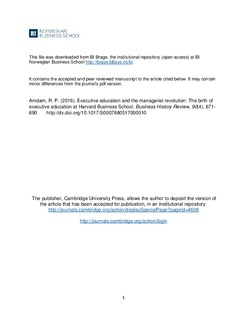Executive education and the managerial revolution: The birth of executive education at Harvard Business School
Journal article, Peer reviewed

View/
Date
2016Metadata
Show full item recordCollections
- Scientific articles [2181]
Original version
Business History Review, 90(2016)4, 671-690 http://dx.doi.org/10.1017/S0007680517000010Abstract
The managerial revolution drove the rise of business schools in the United States and business schools contributed by graduating professional managers. Before World War II, however, the effect of an MBA degree was modest, causing great concern to leading business schools. Harvard Business School—in order to increase this impact—began in the mid-1920s to develop nondegree programs for potential top executives. In 1945, by drawing on the experiences of certain short-lived programs and the extraordinary situation during the war, Harvard Business School launched its Advanced Management Program, which became a global role model for executive education.
Description
The accepted and peer reviewed manuscript